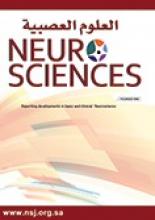Abstract
OBJECTIVE: To evaluate the effects of gabapentin (GBP) administration on mice fetuses.
METHODS: This study was carried out in Birjand University of Medical Sciences during 2008. Thirty Balb/c pregnant mice were divided randomly into 3 groups: 2 experimental groups that received 25 mg/kg (I) and 50 mg/kg (II) of GBP intraperitoneally for the first 15 days of pregnancy, and a control group that received normal saline. External observations of day 18 fetuses and skeleton double staining were performed.
RESULTS: Both experimental groups showed similar disorders that can be categorized as the following: 1) decrease of fetal body weight and increase of fetal resorption, 2) macroscopic malformations, and 3) skeletal malformations. Fetal body weights were significantly lower, and fetus resorptions were significantly higher in both treated groups compared to the control group. Macroscopic malformations included exencephaly, limbs defects, brachygnathia, vertebral column deformity, and fetuses with severe retarded growth. Skeletal malformations included delayed ossification, scoliosis, calvaria deformity, and mandibular hypoplasia.
CONCLUSION: This study revealed that GBP can induce previously unreported severe malformations if it is used continuously during the implantation, neurulation, and organogenesis stages of pregnancy. Therefore, it is suggested that great caution should be exercised in using GBP during the early stages of pregnancy until further studies are performed to better understand these effects.
- Copyright: © Neurosciences
Neurosciences is an Open Access journal and articles published are distributed under the terms of the Creative Commons Attribution-NonCommercial License (CC BY-NC). Readers may copy, distribute, and display the work for non-commercial purposes with the proper citation of the original work.






